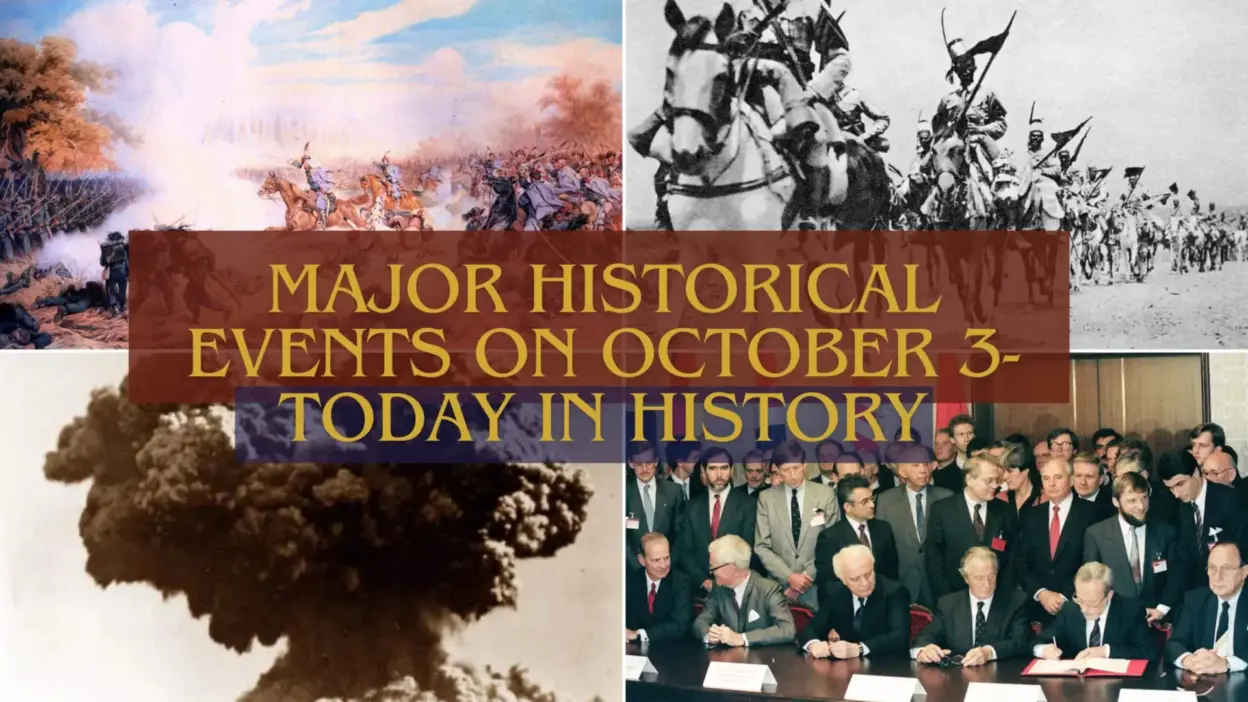Each day in history carries the echoes of events that changed the world, and October 3 is no exception. In this article, we delve into the major historical events that occurred on October 3, exploring the fascinating details behind them. As we take a closer look at this day in history, we gain a deeper appreciation for the forces that have shaped our world.
Major Historical Events on October 3- Today in History
- Battle of Corinth Begins – 1862 AD
- Italy Gains Venetia in Treaty of Vienna – 1866 AD
- Carl von Ossietzky, Peace Advocate, Born – 1889 AD
- Prince Maximilian Appointed German Chancellor – 1918 AD
- Iraq Gains Independence – 1932 AD
- Mussolini’s Invasion of Abyssinia – 1935 AD
- John Heisman, Football Innovator, Passes Away – 1936 AD
- The Maltese Falcon Premieres – 1941 AD
- May-Johnson Bill and Atomic Energy Act – 1945 AD
- First British Atomic Test, Hurricane, Conducted – 1952 AD
- The Andy Griffith Show Debuts – 1960 AD
- The Dick Van Dyke Show Revolutionizes Sitcoms – 1961 AD
- Gwen Stefani, Rock-Ska Icon, Born – 1969 AD
- Gorbachev Agrees to Unified Germany within NATO – 1990 AD
- O.J. Simpson Acquitted in Sensational Trial – 1995 AD
- dies-2004-ad” data-level=”3″>Janet Leigh, Star of Psycho , Dies – 2004 AD
Battle of Corinth Begins – 1862 AD
The Battle of Corinth, a critical confrontation in the American Civil War, commenced in northeastern Mississippi. This battle marked a significant Union victory, weakening Confederate defenses in the region and shaping the course of the war.
Italy Gains Venetia in Treaty of Vienna – 1866 AD
With the diplomatic efforts of Napoleon III, Italy secured Venetia through the Treaty of Vienna. This acquisition was pivotal in the unification of Italy, expanding its territory and influence in Europe.

Carl von Ossietzky, Peace Advocate, Born – 1889 AD
German journalist Carl von Ossietzky, renowned for his pacifist stance, was born in Hamburg. His brave opposition to militarism earned him the 1935 Nobel Peace Prize, even while he was imprisoned in a concentration camp.
Prince Maximilian Appointed German Chancellor – 1918 AD
Known for his diplomatic skills and integrity, Prince Maximilian of Baden was appointed chancellor of Germany. His leadership during the final days of World War I was marked by efforts to negotiate peace and end hostilities.
Iraq Gains Independence – 1932 AD
On October 3, 1932, Iraq gained its independence from British rule, marking the end of the British mandate established by the League of Nations. This was a significant moment in Middle Eastern history, shaping the future of the newly sovereign nation.
Mussolini’s Invasion of Abyssinia – 1935 AD
Under orders from Benito Mussolini, Italian forces led by Emilio De Bono invaded Abyssinia (Ethiopia). This act of aggression aimed to establish a “new Roman Empire,” but it sparked international condemnation and resistance.

John Heisman, Football Innovator, Passes Away – 1936 AD
John Heisman, a legendary figure in American collegiate football, passed away. His contributions to the game, including the introduction of the forward pass, left a lasting legacy in the sport’s evolution.
The Maltese Falcon Premieres – 1941 AD
John Huston’s adaptation of The Maltese Falcon, based on Dashiell Hammett’s iconic novel, premiered. Hailed as one of the greatest detective films ever made, it set a benchmark for the genre and captivated audiences worldwide.
May-Johnson Bill and Atomic Energy Act – 1945 AD
The May-Johnson bill, introduced to regulate atomic research, sparked intense debate in the U.S. Congress. Though it didn’t pass, it led to the creation of the Atomic Energy Act of 1946, shaping nuclear policy for decades.
First British Atomic Test, Hurricane, Conducted – 1952 AD
The British successfully conducted their first atomic weapons test, codenamed Hurricane, aboard the HMS Plym. This event marked the UK’s entry into the nuclear arms race, cementing its position as a nuclear power.

The Andy Griffith Show Debuts – 1960 AD
The Andy Griffith Show premiered on American television and quickly became a cultural phenomenon. Its portrayal of small-town life and comedic charm endeared it to viewers, securing its place as a TV classic.
The Dick Van Dyke Show Revolutionizes Sitcoms – 1961 AD
The Dick Van Dyke Show debuted on CBS, pioneering the modern sitcom format. With its sharp humor and relatable characters, it redefined the television landscape and remains a cornerstone of American comedy.
Gwen Stefani, Rock-Ska Icon, Born – 1969 AD
Gwen Stefani, the lead singer of No Doubt and a prominent solo artist, was born. Rising to fame in the 1990s, she became an influential figure in the music world, blending rock, ska, and pop into a distinctive sound.
Gorbachev Agrees to Unified Germany within NATO – 1990 AD
On this day in 1990, Mikhail Gorbachev agreed to the reunification of Germany within NATO. This decision, spurred by German Chancellor Helmut Kohl, marked the end of Cold War divisions and the formal reunification of Germany.

O.J. Simpson Acquitted in Sensational Trial – 1995 AD
The high-profile trial of O.J. Simpson culminated in a jury finding him not guilty of the murders of Nicole brown Simpson and Ronald Goldman. The case captivated the nation and sparked widespread debate about race and justice.
Janet Leigh, Star of Psycho, Dies – 2004 AD
American actress Janet Leigh, best known for her role in Alfred Hitchcock’s Psycho, passed away at 77. Her unforgettable shower scene in the film remains one of the most iconic moments in cinematic history.
Also Read: Major Historical Events on October 2- Today in History



